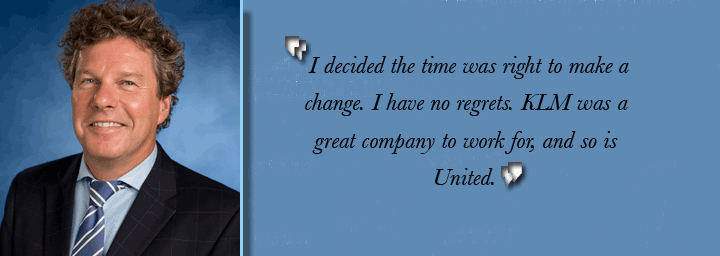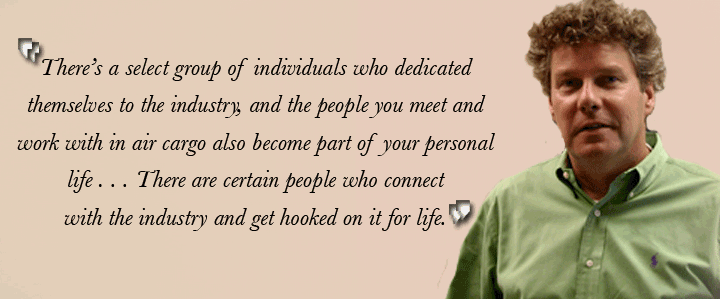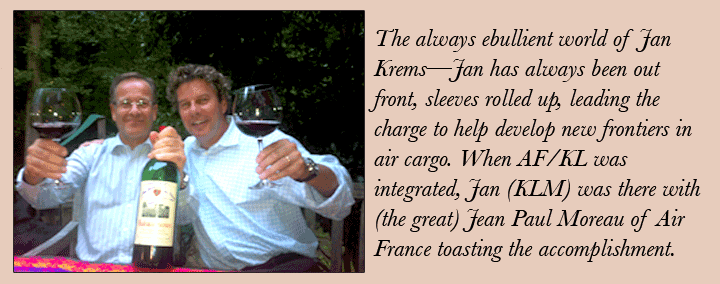
Several years ago,
in the barroom of a Las Vegas hotel where an air cargo industry convention
was being held, a lusty debate took on the proportions of a high-decibel
shouting match. The subject in shrill dispute: has the air cargo industry
achieved a solid state of maturity? The question rocked the barroom.
The peaked voices raged for perhaps an hour.
But then the inevitable thirst for liquid refreshment gradually, one by
one, had the effect of dampening the enthusiastic ventilation, with the
question about maturity unresolved, forgotten, left for another day.
Forgotten, but not for long. The question
vaulted back in my mind when I received the news of Jan Krems’ appointment
to the presidency of United Airlines Cargo. It struck me at once that
Krems’ international crossover from Air France-KLM to the highest
rung on the cargo ladder at one of the United States’ great airlines
was nothing short of an act of industry maturity—a mirror of events
in a globalized marketplace.
 |
For United’s 54-year
old new cargo chief, it has been a highly spirited journey of a little
more than a quarter-century, taking him on a zig-zag world route to the
present: Amsterdam-Manchester-Madrid-Dubai-Singapore-Amsterdam-Paris-Chicago-Atlanta-Chicago.
An airline career was the farthest from
Jan Krems’ thoughts when he earned his BA degree in economics from
Utrecht University, spent the better part of a year with the United Nations
Interim Force in Lebanon, and returned to his native Netherlands to earn
a post-graduate degree in marketing.
It was his mother (bless her heart) who
directed Jan to a newspaper ad for a management trainee program at KLM.
“There were many applicants,”
he recalled, “and it took six interviews before I was accepted as
a KLM management trainee.”
It is hardly a secret that most airline
sales/marketing applicants prefer the passenger side of the business.
Krems, however, chose cargo because of experience in the steel industry.
He has never had cause to regret his decision.
Air cargo involves the handling and movement
of all manner of boxes, bundles, crates, and containers. Does he regard
his efforts as a job or profession? Krems came down hard on identifying
it as a profession, and to further emphasize that point, added: “I
even would say it is a way of life.” A way of life? Would he explain
this? Krems said:
“There’s a select group of individuals
who dedicated themselves to the industry, and the people you meet and
work with in air cargo also become part of your personal life . . . There
are certain people who connect with the industry and get hooked on it
for life.”
 |
After nearly 70 years of a postwar air cargo
industry, would he say that the average shipper is fully conversant with
the economics of shipping by air? In Krems’ view, the industry “can
do a better job of educating the ‘average shipper’ on the
benefits of air freight versus other modes.” He called it a “key
task” for any service product that’s more expensive than its
competing product, to “compensate for the ‘sticker shock’
average shippers might experience when the costs of surface transport
are compared against air transport.” United’s cargo head cited
a number of benefits that shift modal preference from surface to air transport.
Still, it was pointed out to Krems, there
has been a notable shift in transport decision-making from air freight
to surface freight. It certainly included so-called “educated”
air shippers. He readily conceded that, “the challenge of modal
shift, particularly from air to ocean, is something that should concern
all air carriers.” Quoting statistics from the Seabury Group, he
said that since the start of the 21st Century, air cargo tonnage has risen
2.6 percent in contrast to ocean tonnage, which increased 7.4 percent.
Air’s share of containerized weight dropped from 3.1 percent to
1.7 percent in the same period, Air’s average annual loss of tonnage
added up to 400,000 tons. Krems noted that trade lanes from Asia have
been most affected.
What underlies the modal shift? Improved
product and data quality, asserted Krems. Also, the ocean liners have
shaved transport times. When business turns sluggish, “the air cargo
industry tends to pull back on process improvement and technological development.
During the difficult financial conditions of recent years, other transport
modes have upgraded their timeliness and service and are now more formidable
competitors.”
How does one confront this challenge? Krems’
solution is “a coordinated effort to innovate our processes and
invest in product and technology improvements.”
 |
KLM and Air France each
had its own business culture. Asked whether he found the carriers’
merger problematic, Krems claimed that, based on his own viewpoint, the
merger of business cultures was “no more difficult than any other
merger.” But coordination of two major airlines is “always
a slow, gradual process.” Krems held that what consumes the most
time is “changing people’s minds.” He described various
aspects of the process of coordination, underscoring the importance of
“bringing the staff of two companies together into a single culture
. . . a process that is worked out by the individuals from the formerly
separate companies as they interact every day.”
Well, now that he has taken over responsibility
for United’s cargo organization, has he been faced with a somewhat
similar challenge?
Krems’ answer was a flat Yes. He insisted
that there are “more similarities than differences” in United
and Air France-KLM. In his first few months at United, he was able to
apply lessons learned abroad by bringing cargo processes and technologies
together.
Jan Krems has brought
to United Cargo twin plus-factors: an extensive air cargo management career
and an impressive intellectual background. A native of Oss, Netherlands,
married, with two children (pictured with him), he speaks five languages,
including his native Dutch. A glance at his advance toward the upper reaches
of air cargo professionalism reveals gradual, measured progress: a swelling
know-how gained at a deliberate pace, like nature itself. Natura non
facitsaltum, say the scholars, advising that nature (i.e.,
maturity) makes no leap.
From trainee in corporate management, Krems
was assigned to account manager at Schiphol Airport. It required a couple
of years wrestling with accounts before his first break as cargo manager
in a foreign country. Four years were to pass when he was named director-Middle
East and Dubai; and over the ensuing decade he accumulated an arresting
list of titles: director-customer service-Asia; vice president-Asia; vice
president-Europe, Africa, and Middle East; vice president-customer service;
and his final office before taking off for the United States, president-customer
service. Prior to his ascent to the position at United, Krems spent three
years as president-The Americas for Air France-KLM
Working out of Chicago in that job, he was
an easy attraction for the folks at United.
Krems had come to regard KLM as his lifetime
employer, and he was ardent in his loyalty to the airline. He was especially
vocal in his praise and affection for a small group of KLMers who, he
said, had a profound impact on his development as a true professional:
Jacques Ancher, Jan Meurer, Enno Osinga, and Bram Gräber. Given his
heartily expressed warm feelings and KLM, what prompted him to accept
United’s invitation? Krems’ reply was simple:
“I decided the time was right to make
a change. I have no regrets. KLM was a great company to work for, and
so is United.”
| 
|
Based on his experience
dealing with overseas customers and U.S. customers, has he found a notable
difference between them? It may have been so in earlier years, Krems suggested,
but now it is a different ballgame. Consider this:
“We are dealing with many multinational
organizations that have offices—or affiliates—in the U.S.
and in many international locations. These customers determine what their
optimum business processes are, then execute them in a similar fashion
no matter where they are doing business.”
Limiting the question to United’s
domestic market, is Krems presented with a different sort of challenge?
“Definitely,” he said without
wasting a moment, selling and transporting widebody pallets and containers
internationally are strikingly different from executing the same requirements
for bulk freight on narrowbodies domestically. It comes close to being
different businesses, he said. So far as competition in the home market
is concerned, it is more likely to be the road or rail carrier.
Have customer habits changed under the impact
of jet aircraft? Again, Krems replied positively.
“Beyond any doubt,” he declared.
“Air cargo’s role in making more of the world’s goods
quickly accessible to every significant center of population has profoundly
changed the consumer landscape.”
His words about the consumer landscape lent
weight to the old brain-tingler that it is a long road that has no turning.
Krems conceded that a fast rise in demand
can “alter or fade” equally fast. He pointed out that since
much manufacturing is accomplished on a continent distant from the point
of demand, air shipment is “critical to the process” of rapid
delivery to market to exploit consumer interest. He maintained that it
is an ability that “actually creates additional demand.”
 Not
a few shippers and forwarders require customized handling and service
to assure quick, safe delivery of the product. How does United Cargo accommodate
this type of customer demand? Krems stated that the carrier, in collaboration
with its customers, developed a menu of added-value products, which he
described as “key to our business strategy.” There is no better
way to boost yields and margins, and concurrently reduce vulnerability
to outside factors and softening the impact of negative business and economic
cycles that may occur in the future. Not
a few shippers and forwarders require customized handling and service
to assure quick, safe delivery of the product. How does United Cargo accommodate
this type of customer demand? Krems stated that the carrier, in collaboration
with its customers, developed a menu of added-value products, which he
described as “key to our business strategy.” There is no better
way to boost yields and margins, and concurrently reduce vulnerability
to outside factors and softening the impact of negative business and economic
cycles that may occur in the future.
Asked to comment on the role of the IATA-authorized
cargo agent who is father to a long-standing plea for an increase in the
rate of commission, Krems described the agent as “very important,”
and one of his initial objectives at United Cargo was to develop personal
relationships with agents (and presumably with forwarders) and promote
increased “team” engagements with these agents. As to the
thorny issue of agent commission, he deftly sidestepped it with the remark
that the agents are part of United Cargo’s team and they can “expect
to share in the benefits” in the carrier’s “increasing
success” in the future.
Shifting to the topic of cargo handling
at the airport, United Cargo’s president, asserting his personal
opinion, held that the most significant challenge is twofold. The first
is finding the best way to increase warehouse service partner engagement—that
is, creating a vendor staff that shares the airline’s interest in
upgrading quality and customer satisfaction. This boiled down to presence,
input, and involvement. The second challenge is a need that is industrywide:
execution of innovations on the ground. This is vital to the retention
of market share and shutting a door on modal shift. Then, too, the industry
is in need to further streamline shipment and data exchange.
Is the air cargo industry faced with lurking
dangers? Jan Krems responded with the assertion that the “dangers”
underlie familiar key issues: cargo security, environmental sustainability,
global competition from other transport modes, and less paperwork.
With regard to the first of the four “musts”
listed in the preceding paragraph. Krems drew attention to United Cargo’s
steady support and participation in IATA’s air cargo advanced security
pilot, and collaborating with IATA in its effort to “find a global
solution for cargo security that will not disrupt our business”
or lessen the economic benefits of shipping by air. He added: “We
believe that preshipment data and intelligence about who is shipping is
as valuable and effective as post-tender screening in securing the transport
chain. We view electronic targeting as pointing the way to the future
of air cargo security.”
 United
Cargo’s total revenue in 2013 was $882 million, a drop from the
previous year’s $1.02 billion. In terms of cargo ton-miles flown,
in the same year, 2.21 billion were registered last year as against 2.46
billion in 2012. Cargo revenue ton-miles through August 2014 were 2.04
million, producing $1.6 billion. United
Cargo’s total revenue in 2013 was $882 million, a drop from the
previous year’s $1.02 billion. In terms of cargo ton-miles flown,
in the same year, 2.21 billion were registered last year as against 2.46
billion in 2012. Cargo revenue ton-miles through August 2014 were 2.04
million, producing $1.6 billion.
Based on mid-2013 statistics, for North
America origin tonnage approximately 44 percent was lifted to Europe,
Middle East, India, and Africa. Of this tonnage, 22 percent headed to
the Asia Pacific. A bit more than 5 percent of this weight moved to the
Latin region, and 29 percent of this tonnage remained within North America.
With the airline’s traffic and revenue
results showing improvement over 2013, how did the immediate future look
to Krems? Referring to customer information, he looked forward to an “upswing”
in volumes toward the end of 2014. However, he ruled out expectation of
a “peak season.”
Why this negative note? Krem’s answer:
“Too many unpredictable factors.”—overcapacity, to name
one.
No one doubts that air cargo has come a
long way since its birth as a structured world industry, bordering a span
of about seven decades. Widebodies and jetfreighters, automated cargo
handling, e-freight, sophisticated marketing, and sales techniques—all
epitomizing a vibrant industry on the march to achievable goals. Yes,
it is an imposing industry, but is it a better industry? The question
was put to United Cargo’s president because the recent past has
produced some critical comment touching on service quality, management
philosophy, and standards of business relationships. His response was
instantaneous and firmly positive.
“I believe that nearly all facets
of our industry are better than the past, or I wouldn’t be involved
in air cargo.”
Many of the improvements were “compelled”
by both the customer and the competition. He added, that there was no
other course but for the industry to “execute advancements to keep
the industry viable.”
Equally true is the fact that in every area
of gain, “more can be done—and must be done.”
Krems recited a selective group of enhancements
described as “most noticeable and meaningful.”
“The flow of material and particularly
information throughout the transport cycle… the management of capacity
and pricing methodologies… cooperation and coordination between
stakeholders in the air freight process… security procedures.”
Richard Malkin
At age 101, Richard Malkin is in his 71st
year as an air cargo journalist. For More on Richard click here.
malkin101@aircargonews.com |





